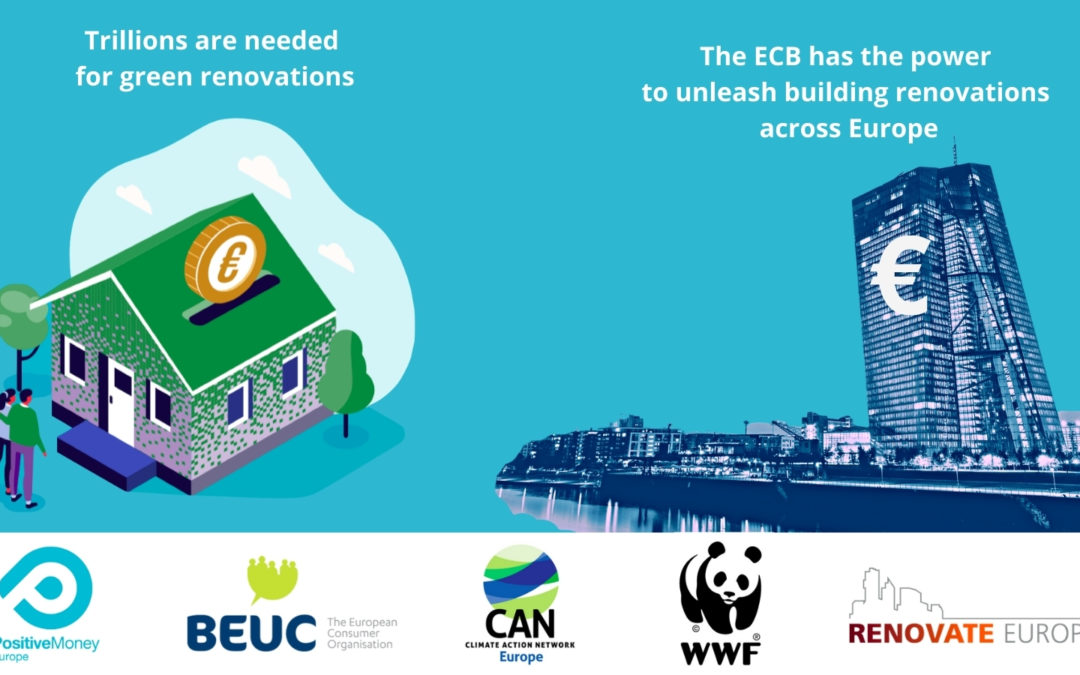Trillions are needed for the deep building renovations required to meet Europe’s climate targets. To make this happen, EU institutions need to use the network of banks across Europe and incentivise loans for home renovation, argue finance campaigners.
This opinion piece originally appeared on the Euractiv website. It is authored by five leaders representing a number of campaign groups, who are listed at the bottom of the article.
Without dedicated financial instruments and technical assistance, the European Commission will miss its goal to at least double the speed of building renovation in Europe. Yet at the height of the pandemic, coordination between member states and EU institutions was key to support struggling economies.
The European Central Bank’s €2 trillion programme of negative interest loans to banks could play a major role in kick-starting renovations and delivering emission cuts, better living standards, jobs and growth.
The Commission’s “Renovation Wave” initiative sets objectives for at least doubling the pace of building renovations in Europe. This is a key priority to reduce carbon emissions across the EU and to tackle energy poverty by reducing the costs of heating bills to citizens.
But the plan suffers from a lack of dedicated EU funding, and although the national plans submitted by member states foresee significant sums for renovation, much more is needed to fulfil the estimated €275 billion annual investment requirements for deep renovation. What’s more, there are already delays in raising and distributing funds. Clearly other sources of funding are needed if the European Commission is to meet its own expectations.
The role of bank lending
With trillions needed for renovation over the next decade and limited capacity to offer sufficient public funds, bank lending is probably the most effective way of distributing extra money to the millions of households and companies that sorely need modern, warmer and more energy-efficient buildings.
There is only one problem. Currently, most home renovations are being funded by households’ savings. For obvious reasons, we cannot afford to wait until everyone sets aside enough savings before kickstarting the renovation wave.
As things stand, consumers simply aren’t taking enough loans to renovate their homes, either because the loans are too expensive or due to the high complexity of navigating the subsidy schemes and seeking technical expertise. Those barriers are even bigger for so-called deep renovation projects.
Therefore making renovation affordable centres on making bank loans as cheap and as well promoted as possible. To tackle this challenge, all synergies between EU institutions and stakeholders must be exploited to their full potential.
During the pandemic, the banking sector was able to unlock billions of loans in a very short period of time because they were aided by state guarantee schemes. Meanwhile, in the background, the European Central Bank (ECB) committed to provide cheap refinancing for banks.
Therein lies the opportunity. The European Central Bank wants banks to increase their lending to the real economy. Through its Targeted Long Term Refinancing Programme (TLTRO), the ECB currently lends money to banks at a -1% interest rate, which effectively means banks are getting paid to borrow from the ECB. It’s literally money for less than nothing.
This concept could include home renovation. The NGO Positive Money Europe has proposed a “renovation-TLTROs” pilot programme whereby the ECB would offer banks an even more negative rate of interest for their share of loans dedicated to building renovations.
With this mechanism, the EU could lean on the powerful network of thousands of bank branches across the continent, and enable the banking sector to play a pivotal role in mainstreaming access to both affordable financing and the necessary technical assistance.
The scheme will essentially drive demand for loans towards the banks, who will receive a subsidy every time they effectively issue a green renovation loan that meets the EU’s future energy efficiency requirements.
To make sure the scheme benefits customers, bank loans should meet strict affordability criteria, in the form of zero-percent loans, with sufficiently long-term horizons for the renovation investment to pay off, and of sufficient size to cover the costs of a deep renovation project.
The interconnection of banks with one-stop shops and other public providers of technical assistance, which ensures that energy efficiency improvement goals are reached, should be a win-win deal for consumers, banks, the climate, the ECB and governments too.
If successful in mainstreaming access for funding for renovation, such an ECB-led pilot programme would, in turn, allow governments to repurpose their own budgets and renovations programmes for example by re-prioritizing public and social housing or for enhanced support for low-income households.
The programme would also be a win for the ECB, having recently adopted a multi-year action plan to hardwire climate change in its monetary policy. This initiative would improve the impact of its negative rate policy on real-life bank lending.
As part of its renewed sustainable finance strategy, the European Commission has already asked the European Banking Authority to develop standards for green loans and green mortgages.
Meanwhile, the European Commission is expected to deliver high standards for deep renovation projects under the revision of the Energy Performance of Buildings Directive (EPBD).
If those two initiatives are well-coordinated, it would effectively result in providing a framework for identifying robust eligibility criteria to the ECB’s discounted interest rates under a TLTRO programme.
The opportunity is too big to be ignored. The ECB and the European Commission should initiate technical cooperation to ensure the renovation wave gets the liquidity it needs to succeed.
Signatories:
- Stanislas Jourdan, Positive Money Europe
- Monique Goyens, BEUC
- Edoardo Concari Coppola, Climate Action Network (CAN) Europe
- Sébastien Godinot, WWF European Policy Office
- Adrian Joyce, Renovate Europe Campaign

